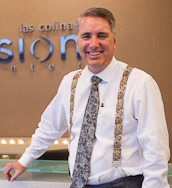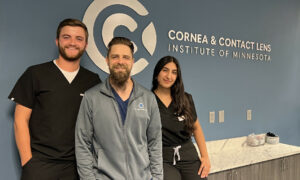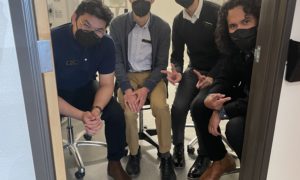By Ken Krivacic, OD, MBA
Here’s how to score points in superior staff management and long-term practice profitability.?
What does an inspiring basketball coach who won an NCAA championship in 1983 and independent optometry today have in common? The answer would be several lessons that we can study and implement into how we lead our practices.
Several months ago ESPN aired an episode of “30 for 30” entitled “Advance or Die,” a two-hour documentary featuring the story of a young basketball coach who took over a mediocre North Carolina State University basketball program in the early 1980’s, and in the span of three years, unexpectedly won the NCAA national championship. As leaders of our optometric practices, coach Jimmy Valvano offers us lessons on how to lead a group of people to do more than what is expected of them or more than what they themselves believed they could accomplish. Whether it’s college basketball or a solo optometric practice, four key lessons can be applied.
Share Your Practice Vision with Staff
When coach Valvano was hired as the basketball coach at North Carolina State he was a relative unknown. Most of the players who were on the team previous to the coach’s hiring had never heard of him before. When he gathered the players together for the first practice he did not make them run sprints or shoot free throws or run plays. Rather, for the first practice, coach Valvano showed up with a ladder and a pair of scissors. He raised the ladder up to the basketball goal and made each player, one by one, climb the ladder and cut one of the cords from the basketball hoop. For those of you who are not sports fans, this action is usually reserved for a team that wins a championship. Almost every player interviewed recalled that they thought he was crazy. Yet coach Valvano had a dream. He was sharing his vision for what he hoped to achieve and he was establishing a culture. For him this was to establish a vision and culture of winning.
Optometric takeaway: Establish Culture. We can do the same in our practices to share our vision or establish a culture. Basketball practice for us is our staff meetings or our training sessions with staff, or even the short ones we have with individual staff members. This time between practice leader and staff is when we can share our vision and establish our culture. You should not assume that all employees understand what you want done. This requires constant communication and should be done on a regular basis with all staff. For example, you may have told staff you wanted to enhance service in the optical dispensary. To illustrate that vision you might try a one-hour training session in which role-play exercises show employees how to handle a patient who was unhappy with her last purchase; how to educate a hesitant patient about the benefits of quality sunwear; or how to guide a patient who has no idea what he wants so he walks out the door with a pair of glasses he will love to wear.
Create an Enjoyable (as well as Efficient) Work Place
One of coach Valvano’s themes in his life and his relationship with his players was to have fun. In a speech he gave at the ESPY Awards shortly before his death he stated his philosophy: “To me, there are three things we all should do every day. We should do this every day of our lives. Number one is laugh. You should laugh every day. Number two is think. You should spend some time in thought. And number three is, you should have your emotions moved to tears, could be happiness or joy. But think about it. If you laugh, you think, and you cry, that’s a full day. That’s a heck of a day. You do that seven days a week, you’re going to have something special.”
Optometric Takeaway: We should follow coach Valvano’s advice and laugh each day. Learn not to take every situation quite so seriously. If you’re not good at humor yourself, have others help. For instance, at our company retreats we occasionally run clips of comedians. It’s amazing what laughter will do to loosen people up and make being around each other more enjoyable and make the meeting more enjoyable. On an everyday basis, staff takes cues from their boss, so if you feel comfortable enough to laugh easily, they also may feel open to do so.
Show Your Employees Appreciation
Coach Valvano died from cancer in 1993 approximately 10 years after he had led his team to the NCAA national championship. The “30 for 30” episode was filmed 20 years after his passing, yet every player on that team had nothing but praise and respect for coach Valvano as they were interviewed for the documentary. That respect is a reflection of the respect he had for his players. He told them he appreciated them and he was sincere.
The players mentioned that coach Valvano would occasionally call them into his office and ask them to talk about anything they wanted to. After a while they developed a relationship with their coach that went beyond the basketball court. He wanted to know them as a person and not just a player.
Optometric takeaway: When was the last time you thanked an employee for a job well done? When was the last time you told an employee you appreciate what they mean to the practice? Words, especially words from the leader of a practice, can go a long way to fostering a great work environment and fostering an environment where people want to succeed. Set a goal for yourself to catch one person a day doing something that enhances the practice and pull them aside and personally thank them for a job well done.
When was the last time you called an employee into your office and just asked them to talk about anything they wanted and not just about work? Take an employee to lunch occasionally and just talk about what’s happening in their lives, or better yet, let them do the talking and you listen.
Have Persistence in Reaching Practice Goals
One of Valvano’s most memorable motivational speeches was delivered February 21, 1993, at Reynolds Coliseum on NCSU’s basketball court during the ten-year commemoration of the University’s 1983 NCAA championship. It was during this speech that Valvano stressed the importance of hope, love and persistence and included his famous “Don’t give up, don’t ever give up” quotation.
In their run to the national championship of 1983 North Carolina State had to win nine games in a row. Any loss along the way and they were finished. Coach Valvano instilled in his players a never say die attitude that carried them to that national title.
Optometric takeaway: This theme can be practiced in our everyday optometric challenges. If we focus on a goal and are not easily discouraged we can accomplish almost anything. Examples can range from continually looking at your costs to run the practice to striving to make the customer service at your office Ritz-Carlton quality. Be sure to set measurable goals such as raising revenues by a certain amount or maybe gaining a certain number of referrals per month so you will know when all that persistence has finally paid off.
Practice Continuous Learning
As part of your role as the leader of the practice, learn from others. Watch documentaries on leaders and leadership. Read a book about a great leader. Join an optometric mentoring group and garner ideas from others. You may surprise yourself in what you can then bring to your practice and enhance your practice not only for your staff and your patients, but also for yourself.
Related ROB Articles
How Engaged is Your Staff with Practice Goals?
Staff Retreats: Focus on Goals to Enhance Patient Care and Revenues
Put Me In, Coach: How Professional Coaching Can Make You a Winning Team
Ken Krivacic, OD, is the owner of Las Colinas Vision Center in Irving, Texas. To contact him: kkrivacic@aol.com.



























